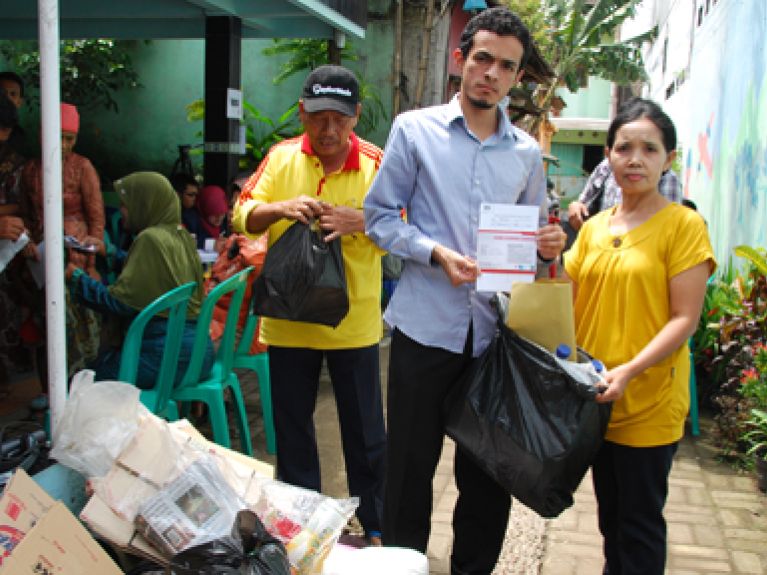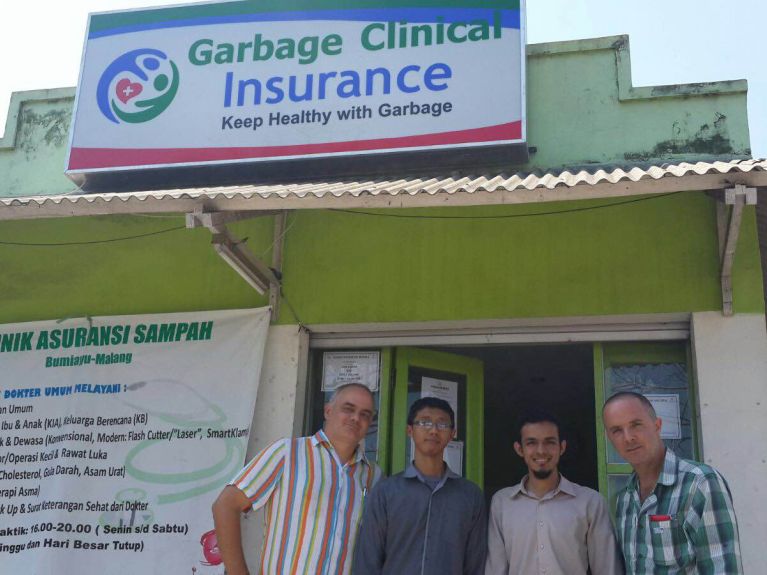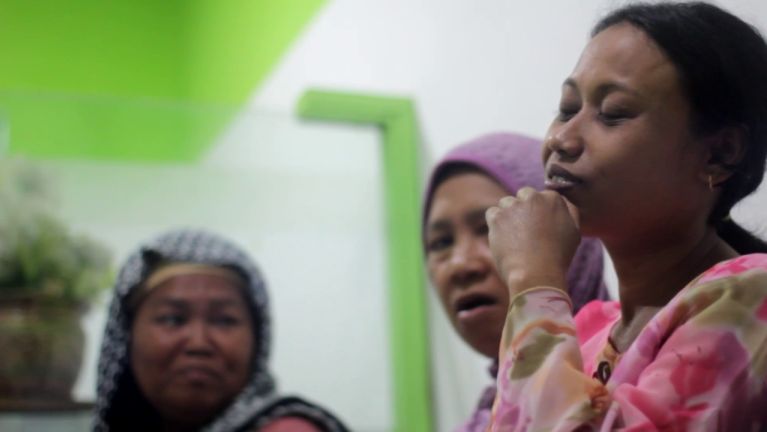Garbage Clinical Insurance, Indonesia
Garbage Clinical Insurance (GCI) is a micro health insurance program which uses garbage as a financial resource.

Project name: Garbage Clinical Insurance
Project location: East Java, Indonesia
Website: http://www.indonesiamedika.com/
Dieses YouTube-Video kann in einem neuen Tab abgespielt werden
YouTube öffnenThird party content
We use YouTube to embed content that may collect data about your activity. Please review the details and accept the service to see this content.
Open consent formProject description:
Garbage Clinical Insurance (GCI) is a micro health insurance program which uses garbage as a financial resource. With this program, the community pays clinical services by using garbage in an insurance scheme.This way can make the community mobilize their own unused resources to improve health access and breakdown barrier between health facilities and community. The main principle of Garbage Clinical (GCI) is organizing community to create sustainable financing and open health access. On the other side, it becomes an incentive for the community to start a proper waste management and waste entrepreneurship from household level.
Goal and purpose of the project:
The main principle of Garbage Clinical Insurance is organizing communities to create sustainable financing from their own resources in order to improve the access and the quality of public health program from the promotive, preventive, curative and rehabilitative aspects. On the other side, it becomes an incentive for the community to start a proper waste management and waste entrepreneurhip from household level. To a certain extent, it also contributes to local sanitation improvement. Garbage Clinical Insurance increases garbage value exponentially, so Garbage Clinical Insurance empowers every individual to mobilize overlooked resources and take an active role in managing health financing. We change the perception and habits of the community towards garbage with new innovative system of garbage insurance scheme. We promote health investments with garbage.

Motivation of the applicant / applicant team:
Indonesia is classified by the World Bank as a lower-middle-income country. Until now, "limited resource" has become the cliché of poor health service for the poor. Although household health insurance population coverage rates have increased in the last decade or so almost 85 % of the population still remains without any coverage. Recent estimates indicate that about 18 % of its population continues to live below US$1 a day, and about half lives below $2 a day. Households spend about 2.1 % of their total consumption on health, ranging from about 1.6 % for the poorest decile and 3.5 % for the richest, which is relatively low compared to other countries with similar income levels.
This is exacerbatedby low management system of municipal soild waste, which has been linked to premature deaths, serious illness, and diminished quality of life. Households provided with government-run waste management services are forced to pay a monthly collection fee as little as about $1.10 and as much as $3.20. Endeavors that are arranged by the government and private sectors toward enhancing the quality of public health and municipal solid waste can have significant impacts if they are accompanied by individual and community awareness. If it is organized, the community can mobilize its own resources toobtain the services they need.
We believe that health is a fundamental human right. Hovewer, in reality many people cannot get health access because they do not have sufficient money and the cost for medication is expensive. Indonesia has a huge problem regarding access to healthcare. Many people can not get access to health care due to financial factors. For example, the true story of a 3-year-old girl, Khaerunissa, that happened June 5, 2005. She was the daughter of a 38-year-old scavenger, Supriyono, who only earned 10,000 every day. She got diarrhea, but she could not get access to health services due to unaffordable health cost. Finally, she died because of diarrhea. In responding to this heart-breaking social phenomenon, then we started to think howwe could create health financing model which permitted all people to get health access. Garbage is the best solution because almost every day every house produces garbage which is not used, so that all citizens can join our program. For instance, an urban area like Malang, where this program has been developed, produces more than 55.000 tons of solid waste everyday, but only 50-60 % is collected.
This motivates us to develop garbage insurance scheme as health financing that we call Garbage Clinical Insurance. Garbage Clinical Insurance(GCI) is a micro health insurance program which uses garbage as a financial resource. With this program, the community pays clinical services by using garbage in an insurance scheme.This can make the community mobilize their own unused resources to improve health access and breakdown barriers between health facilities and community members. We open doors to health access.
Use of prize money:
We will allocate the money into:
1. Waste Management
• Procurement complete
• Waste management processes in place
• Waste centre is ready to operate
2. Replication Management
Implementing plans to participate in the Global GCI network and using knowledge gained from other GCI replications to further develop GCI in line with local context
3. Family Medicine
• Procurement complete (Clinic ready to accept patients)
4. Integration with national health insurance coverage
• Integrate system
